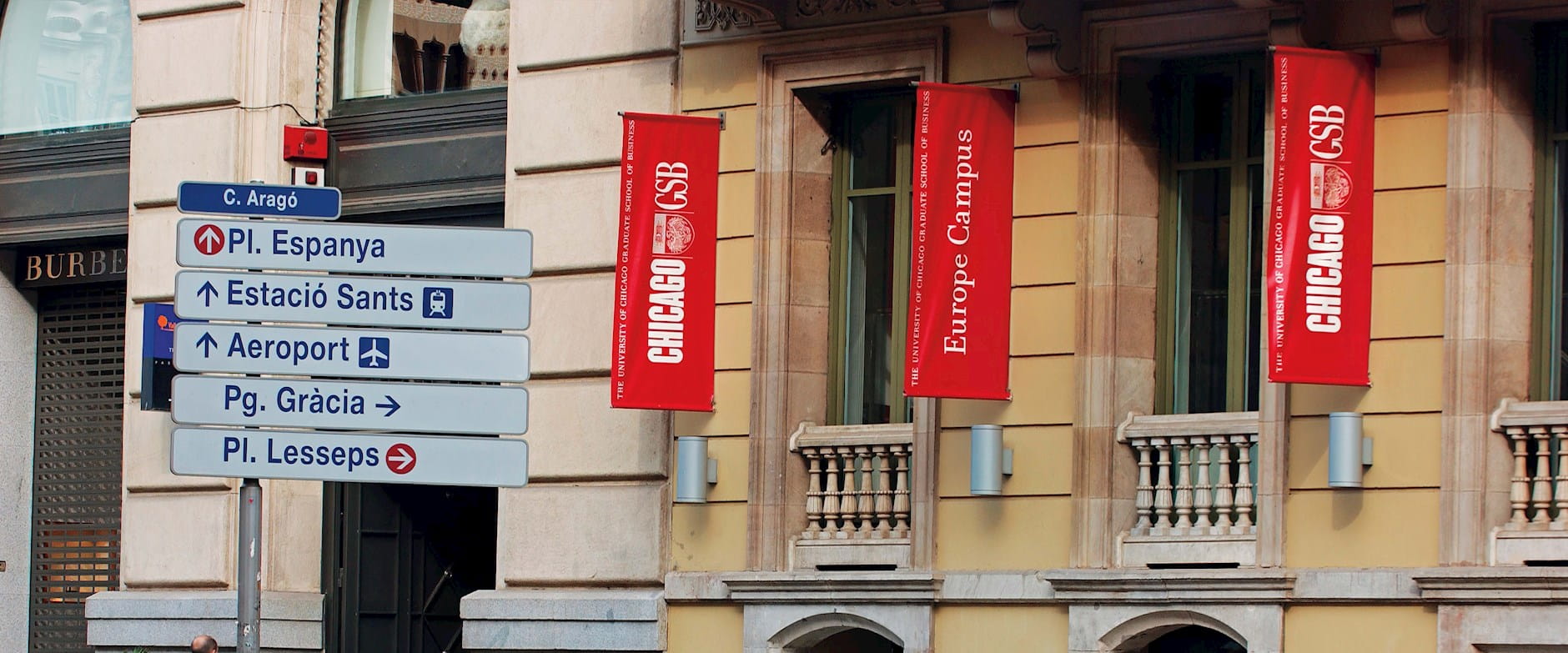This fall, the members of the 30th cohort of the Chicago Booth Executive MBA Program Europe will take their seats at the Robert Rothman, ’77, London Campus.
When the Europe program started in 1994, it was Booth’s first international executive MBA program, and it was located in Barcelona, not London.
“It was a bold move for them to offer that kind of program, a real Chicago degree in Europe,” says Rolf Friedli, ’96 (EXP-1), chairman of Switzerland-based investment firm Capvis Equity Partners. “Because it was an executive program and we had people from diverse backgrounds, a lot of our peers had impressive and entrepreneurial career paths. We learned the culture of debating and that the best idea wins.”
Fueled by Booth’s desire to impact an increasingly global market, the program was launched in partnership with Spanish bank Argentinaria (BBVA). The then–deputy dean for MBA Programs, Harry L. Davis, the Roger L. and Rachel M. Goetz Distinguished Service Professor of Creative Management, proposed that while it may not be feasible to bring international students to Chicago, Chicago could be brought to them.
The first cohort was a diverse group of 50 students from 14 nations. They traveled to Barcelona for intensive sessions, taught by renowned faculty from the Chicago campus.
“Because the building wasn’t even quite finished when we moved in, you really had a sense of being truly pioneering,” recalls Robert (Bob) Wardrop, ’96 (EXP-1), a management practice professor of finance at the University of Cambridge Judge Business School and founder and CEO of RegGenome, a commercial spin-off of the university that aims to transform how the world produces and consumes regulatory information. “That’s kind of a bonding phenomenon.”
Courses followed a similar schedule to those for Executive MBA students in Chicago, beginning around 8 a.m.; but the day didn’t end until well after 10 p.m., following a late Spanish dinner. It created a “work hard, play hard,” atmosphere, Wardrop recalls, leaving students and faculty feeling “punch drunk” by the end of the sessions. As on the Chicago campus, most students were balancing school with full-time careers and family.
“We all had the same challenge, working and studying at the same time,” says Marie-Ghislaine Croquet, ’96 (EXP-1), senior human resources business partner at Etex, a sustainable building materials company with headquarters in Zaventem, Belgium. “We could apply what we learned very quickly.”
Croquet enrolled in the program because she wanted to grow in her human resources role through additional training in leadership and decision-making.
“It was a bold move for them to offer that kind of program, a real Chicago degree in Europe. Because it was an executive program and we had people from diverse backgrounds, a lot of our peers had impressive and entrepreneurial career paths. We learned the culture of debating and that the best idea wins.”
— Rolf Friedli, ’96 (EXP-1)
As part of the program, the students traveled to Chicago for course modules with their US counterparts—international joint sessions that remain an important element of EXP today.
“Something we learned in Chicago was to look at the culture of a company,” Croquet says. “It’s helped me recognize any time my values were no longer corresponding to the values of the company where I was working.”
José Antonio Álvarez, ’96 (EXP-1), vice chair of the board of directors of Banco Santander, says the program’s emphasis on exchanging ideas and taking in other points of view was beneficial to him as CFO and then CEO of Spain’s largest bank. It also taught him to make a compelling business case when meeting with stakeholders.
“We gained the capacity to translate to people what we are doing and why—what makes sense from an investment point of view,” he says.
In 2005, the program moved to London, where Booth continues to be the only US business school to have a footprint. And after 15 years, in 2020, the new state-of-the art Rothman Campus was completed in the heart of the city’s financial district, with expanded space for interactive courses, events, and corporate conferences to bring together innovative thinkers from across the Europe, Africa, and Middle East region.
Friedli, who remains engaged with Booth as a member of the Global Leaders Group, says the program changed the way he approaches solving problems, tackling projects, and managing people, and the school’s strong brand has been a boost for him throughout his career.
“We had such a great connection with our professors,” he says. “After all these years, when I’m in Chicago or London, I still meet with professors, and we have wonderful discussions about the experience of EXP-1. A lot of memories come up. It was a special bunch of people that did the first one.”


